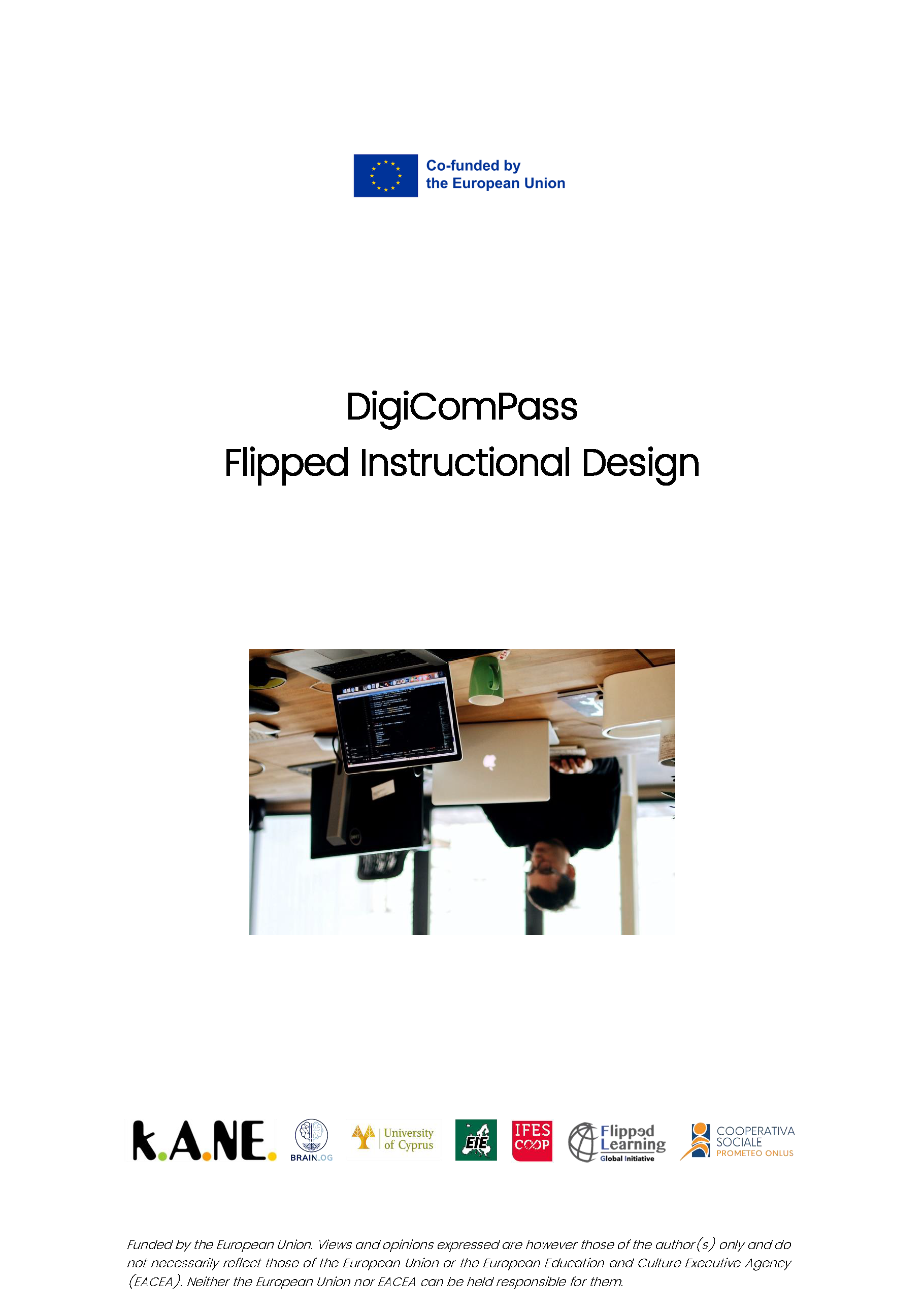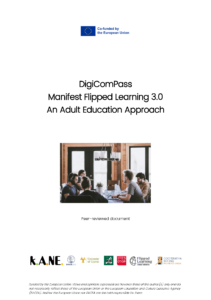Here you can download material developed during the project’s lifetime. To download the material in another language, please switch the language!
Flipped Instructional Design
The Flipped Instructional Design, rooted in the Flipped Learning 3.0 Framework, represents a transformative shift in the educational paradigm, emphasizing a student-centered approach to learning. This design strategically inverts traditional teaching methods by delivering instructional content outside of the classroom, primarily through digital means, allowing learners to engage with materials at their own pace.
Consequently, classroom time, once dominated by lectures, is now repurposed for interactive, hands-on activities that foster deeper comprehension and application of knowledge. In this model, educators transition from being mere content deliverers to active facilitators, guiding students in collaborative and individualized learning experiences.
Continuous assessment and a flexible learning environment further enhance the efficacy of this approach, ensuring that education is tailored to individual needs while promoting active engagement and more profound understanding.
The document covers all aspects of an Instructional Design. Current version: 4.0 (July 2023)
Manifest Flipped Learning
This document provides a comprehensive guide to the adoption and application of Flipped Learning 3.0 within Adult Education. It begins with an introduction that outlines how to utilize the document, the evolution of Flipped Learning, and its significance for adult learners. A detailed examination of the adult learner’s profile, including comparisons with other learner types, motivations, challenges, and the impact of technology, sets the foundation for understanding the targeted demographic.
Core concepts of Flipped Learning 3.0 are then expounded, highlighting its definition, key principles, and the pedagogical shift from traditional to flipped learning, along with specific benefits for adult education. Instructional design is addressed through an analysis of learning objectives, the role of backward design, competency-based approaches, and the incorporation of interactive activities, assessment, content creation, and technology.
The document offers strategic guidance for adult education organizations and instructors on implementing Flipped Learning 3.0, with particular focus on infrastructure, educator training, and program evaluation. Potential challenges, such as technological hurdles, resistance, and the need for inclusivity, are acknowledged with suggested solutions. Looking forward, the document contemplates the future trajectory of Flipped Learning 3.0 in adult education. Supplementary materials, including a glossary, additional resources, and terminology, provide further depth and context, underscoring the document’s utility as a resource for enhancing learning outcomes through innovative pedagogical strategies.
The Trainer Handbook
This document provides a comprehensive introduction to an adult education course concept, beginning with foundational principles and an overview of Flipped Learning 3.0 (FL3) and its benefits for learners. It outlines the main training modules covering digital competencies, communication, safety, and problem-solving.
Additional chapters address implementation guidelines for FL3 and platform usage instructions. Special considerations for inclusion and its application are also discussed. The document concludes with recognition and accreditation frameworks, as well as course evaluation.
The DigiComPass Training Course – A Flipped and AI-based Approach to Content Creation
This paper presents the findings of an empirical study on the use of Generative Artificial Intelligence (AI) for content creation within a Flipped Learning 3.0 training course aimed at enhancing adult digital competencies. The study is part of the Erasmus+ KA2 project “Digital Competences Recognition Framework for Adult Education” (2022-1-CY01-KA220-ADU-000085965) and was presented at the INTED2024 in Valencia.
The research demonstrates that AI can serve as a valuable aid in the Flipped Learning 3.0 environment, assisting in tasks such as creating multimedia content, generating interactive training materials, and developing assessment tools for both self-evaluation and formal testing. This assistance lets trainers concentrate on strategic activities like designing learning experiences and crafting video storyboards. However, there is an issue with AI outputs not being compatible with multimedia content creation tools like H5P or Canva.
Despite its potential, the study identifies several challenges in using AI for content creation. Current AI tools, including ChatGPT, CANVA, DALL-E, and AI-supported correction tools, are limited and imperfect for this purpose. These tools can also be costly, time-intensive to learn, and require thorough verification to ensure the accuracy and reliability of the content they produce.
In conclusion, while AI has significant potential as a content creation tool in flipped classrooms, it is crucial to recognise the associated challenges and limitations. AI cannot replace the role of content developers. Based on insights from participating trainers and content developers, the study also offers recommendations for those involved in similar training courses.
Remark: This download of the draft of this paper is available only in English!
DigiComPass Evaluation guide
The DigiComPass Evaluation Guide is a collaboratively developed resource designed to support trainers in assessing participants’ progress and competencies within the DigiComPass training course. This comprehensive document includes tools such as clear guidelines, illustrative examples, checklists, and specific trainer support for evaluation processes.
The guide outlines structured evaluation methods to ensure participants are graded fairly and accurately. Additionally, it includes criteria for evaluating the effectiveness of transferred course content, thereby enabling trainers to maintain consistency in course quality. The document is a PDF, serving as a practical reference for trainers to facilitate thorough and standardized evaluations.
![]() All downloads are published under a CC 4.0 BY-NC-SA Licence. This licence lets others remix, tweak, and build upon your work non-commercially as long as they credit you and licence their new creations under identical terms.
All downloads are published under a CC 4.0 BY-NC-SA Licence. This licence lets others remix, tweak, and build upon your work non-commercially as long as they credit you and licence their new creations under identical terms.





